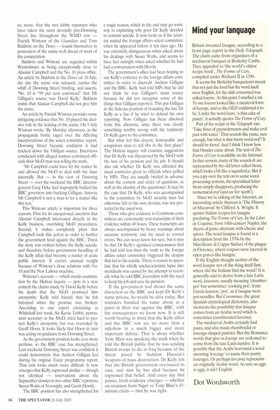Mind your language
Britain invented lasagne, according to a front-page report in the Daily Telegraph. The claim came from organisers of a mediaeval banquet at Berkeley Castle. They appealed to 'the world's oldest recipe book', The Forme of Clay, compiled under Richard II in 1390.
It seems the Berkeley banqueteers meant that not just the food but the word itself were English, for the dish concerned was called loseyns. At this point I smelled a rat. To me loseyns looked like a medieval form of lozenge, and so the OED confirmed it to be. Under the word lozen, 'a thin cake of pastry', it actually quotes The Forme of Cury.
Part of the recipe in the Telegraph ran: 'Take flour of paynedemayns and make erof past with water.' That sounds like pasta, sure enough, but what is that funny word erof? It should be therof. And I think I know how that blunder came about. The text of The Forme of airy is available on the Internet. In that version, many of the sounds th are represented by the old letter called thorn, which looks a bit like a squashed p. But if you copy over the text on to some wordprocessing systems, the specialised letter thorn simply disappears, producing the nonsensical erof (and see for `seeth').
Since we're talking of the Internet, an interesting article thereon is 'The History of Macaroni' by Clifford A. Wright. It quotes Italian recipes for lasagna predating The F01711e of Cuty. In the Liber de Coquina, from 14th-century Naples, the sheets of pasta alternate with cheese and spices. The word lasagna is found in a description from the 1370s by the Marchione di Copp° Stefani of the plague in Florence, where corpses were layered in open graves like lasagne.
If the English thought neither of the word lasagne nor of the thing itself first, where did the Italians find the word? It is generally said to derive from a late Latin word, lasanum, usually meaning 'chamberpot' but sometimes 'cooking pot', from Greek lasanon, 'pot', as if lasagne were pot-noodles. But Corominas, the great Spanish etymological dictionary, also mentions the possibility that lasagna comes from an Arabic word which is sometimes transliterated lawzinaj.
The mediaeval Arabs certainly had pasta, and also made rhomboidal or lozenge-shaped pastries. But the Romance words that give us lozenge are reckoned to come from the late Latin lapidea. It is possible that the Arabs borrowed a word meaning 'lozenge' to name their pastry lozenges. Or perhaps kovzimf represents an originally Arabic word. As sure as eggs is eggs, it ain't English.
Dot Wordsworth


























































 Previous page
Previous page